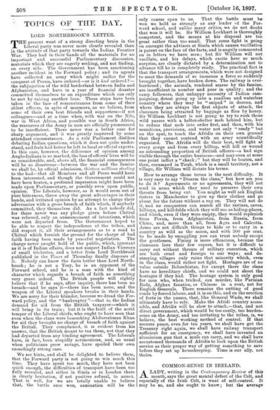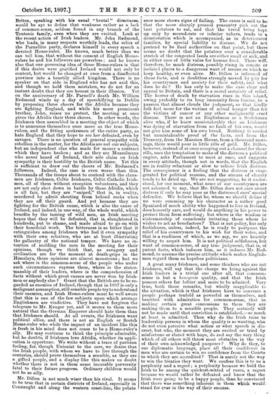COMMON-SENSE IN IRELAND.
A LADY, writing in the Contemporary Review of this month, says the great mental defect of the Celt, and. especially of the Irish Celt, is want of self-control. It may be so, and she ought to know; but tie average Briton, speaking with his usual " brutal " directness, would be apt to define that weakness rather as a lack of common-sense, seldom found in any branch of the Teutonic family, even when they are excited. Look at the recent action of Irish leaders. Mr. John Redmond, who leads, in many respects worthily leads, the relics of the Parnellite party, declares himself in every speech a devoted Home-ruler. He knows, much better than we can tell him, that without the consent of English Home- rulers he and his followers are powerless ; and he knows also that one governing idea of those Home-rulers is that if this desire were gratified Ireland would not only be content, but would be changed at once from a disaffected province into a heartily allied kingdom. There is no speaker on that side in England who has not said this, and though we hold them mistaken, we do not for an instant doubt that they are honest in their illusion. Yet on the anniversary of Mr. Parnell's death Mr. William Redmond winds up a day of speechifying in Dublin by proposing three cheers for the Afridis because they are fighting England, and while his more prominent brother, John, raises no protest, the meeting at once gives the Afridis their three cheers. In other words, the Irishmen then assembled in a meeting the object of which is to announce themselves once more as the true Home- rulers, and the fitting spokesmen of the entire party, so hate England that they hope to see her defeated, even by savages. There is no question of general sympathy with rebellion in the matter, for the Afridis are not our subjects, but an independent clan who made for money a contract which they have broken ; and as they are Mussulmans who never heard of Ireland, their sole claim on Irish sympathy is their hostility to the British name. Yet this is sufficient to draw out the cheers of Mr. Redmond's followers. Indeed, the case is even worse than this. Thousands of the troops about to contend with the clans- men are Irishmen, Celtic Irishmen, Celtic Catholic Irish- men, all of them without exception volunteers, and they are not only shot down in battle by these Afridis, which is all fair, but they are "sniped," that is, in reality, murdered by adroit shooting from behind rocks when they are off their guard. And yet because they are fighting for the British cause, which is also the cause of Ireland, and indeed, in one way, of the whole world, which benefits by the taming of wild men, an Irish meeting hopes that they will be defeated, that is, slaughtered in hundreds, put to shame, and made afraid to go on with their beneficial work. The bitterness is so bitter that it extinguishes among Irishmen who feel it even sympathy with their own relatives, who are at least illustrating the gallantry of the national temper. We have no in- tention of scolding the men in the meeting for their opinions, though we think that, as savagery and civilisation are for the moment at death-grips in the Himalaya, those opinions are almost monstrous ; but we ask where is the common-sense of the people who under such circumstances express them, where is the states- manship of their leaders, where is the comprehension of facts without which great causes are never won by Irish- men or anybody else ? Grant that the British are to be re- garded as enemies of Ireland, though that in 1897 is only a malignant assumption, still sensible people try to understand their enemies, and Irish Home-rulers must be well aware that this is one of the few subjects upon which average Englishmen are vindictive. They have not forgiven the telegram to Mr. Kruger yet, and it seems to them more natural that the German Emperor should hate them than that Irishmen should. At all events, the Irishmen want political allies, and there is not an English or Scotch Home-ruler who while the impact of an incident like this is fresh in his mind does not cease to be a Home-ruler's ally. He may continue to think the principle admirable, but he doubts, if Irishmen love Afridis, whether its appli- cation is opportune. We write without a trace of partisan feeling, for, though Unionist to the core, we desire that the Irish people, with whom we have to live through the centuries, should prove themselves a sensible, as they are a gifted people, and a display like this makes us doubt whether there is not in them some incurable perversity fatal to their future progress. Ordinary children would not be so silly.
Mr. Dillon is not much wiser than his rival. It seems to be true that in certain districts of Ireland, especially in Connaught and along the western coast-line, the potato once more shows signs of failing. The cause is said to be' that the more sharply pressed peasantry pick out the best potatoes to eat, and that the breed being kept up only by second-rate or inferior tubers, tends to a deterioration which is accompanied, as in deteriorated families, by special liability to disease. We do net pretend to be final authorities on that point, but there seems no doubt that the potatoes over a considerable stretch of the congested lands are either small or sick, and in either case of little value for human food. There wilt therefore, be much distress, possibly rising in remote or isolated places to a dangerous want of means on which to keep healthy, or even alive. Mr. Dillon is informed of those facts, and is doubtless strongly moved by pity for his countrymen and anxiety for their safety, and what does he do ? He has only to make the case clear and appeal to Britain, and there is a moral certainty of relief. The horror of death by starvation rises in this island, owing probably to its long immunity from famine, to a. passion that almost clouds the judgment, so that kindly folk feel more for the victims of actual hunger than for the victims of cancer or any other malignantly cruel disease. There is not an Englishman or a Scotchmau alive who, if he knew unmistakeably that an Irishman was dying of starvation from no fault of his own, would not give him some of his own bread. Nothing is needed but unmistakeable proof of the facts, and from the Treasury, from the Mansion House, from a thousand meet- ings, there would pour in little rills of gold. Mr. Dillon, however, instead of at once scooping out a channel for those rills, uses the temptation to make of the distress a political engine, asks Parliament to meet at once, and suggests in every attitude, though not in words, that the English are in reality reluctant or slow to relieve Irish distress. The consequence is a feeling that the distress is exag- gerated for political reasons, and the stream of charity tends to be dried up. We are not suggesting, be it under- stood, for one moment, what some of our countrymen are not ashamed to say, that Mr. Dillon does not care about distress if only he may pose as the distressed ones' special defender. We believe that he, whom we should define if we were summing up his character as a rather good Spaniard of much ability who happened to live in Ireland, does honestly care, and would do anything in his power to protect them from suffering; but where is the wisdom or statesmanship of causelessly irritating those whom he wishes to act as benefactors ? That is not policy, but only foolishness, unless, indeed, he is ready to postpone the relief of his countrymen to his wish for their votes, and that is a readiness of which, as we say, we are heartily willing to acquit him. It is not political selfishness, but want of common-sense, of any true judgment, that is, of patent facts, which induces him, as it induces Mr. Red- mond, to assume the precise attitude which makes English- men regard them as hopeless politicians.
A great many Irishmen, and some thinkers who are not Irishmen, will say that the charge we bring against the Irish leaders is a trivial one after all, that common- sense is but a bourgeois quality, and that the Irish possess others far loftier and more to be admired. Very true, both those remarks, but wholly inapplicable to the situation, which is that Irishmen have to convince a. people perhaps tenfold as powerful as themselves, and besotted with admiration for common-sense, that in making certain great concessions to them they are making them to a sensible people. They certainly will not be made until that conviction is established,—so much at least is admitted. Then why do the Irish raise to leadership persons in whom the quality is so wanting, who do not even perceive what action or what speech is dis- creet, but who, the moment they are excited or tried by misfortune or elated with hope, do and say the very thing which of all others will throw most obstacles in the way of their own acknowledged purposes ? Why do they, to use diplomatic language, place all their confidence in men who are certain to win no confidence from the Courts to which they are accredited ? That is surely not the way to win the treaties they want. We confess this is to us a perplexity and a regret ; a perplexity because we hold the Irish to be among the quickest-witted of races, a regret because we would rather be defeated and know that the Irish were going to be a happy people, than be convinced that there was something inherent in them which would, stand for evar in the way of their success.







































 Previous page
Previous page